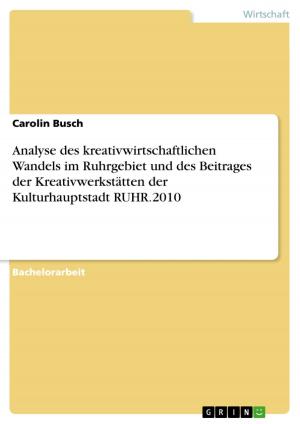The concept of virtual water as a policy tool?
Virtual water trade and its implications
Business & Finance, Economics, Sustainable Development| Author: | Kristina Kirfel | ISBN: | 9783640958917 |
| Publisher: | GRIN Verlag | Publication: | July 14, 2011 |
| Imprint: | GRIN Verlag | Language: | German |
| Author: | Kristina Kirfel |
| ISBN: | 9783640958917 |
| Publisher: | GRIN Verlag |
| Publication: | July 14, 2011 |
| Imprint: | GRIN Verlag |
| Language: | German |
Studienarbeit aus dem Jahr 2010 im Fachbereich VWL - Umweltökonomie, Note: 1,3, Humboldt-Universität zu Berlin (Environmental and Resource Economics), Veranstaltung: Land and Water Management, Sprache: Deutsch, Abstract: Water is distributed unevenly over the globe, making it scarce in many regions of the world. This scarcity is projected to increase significantly due to rapid population growth and increasing per capita affluence, leading to higher per capita water consumption. Global climate change may be an additional factor intensifying water shortness in some regions due to an increasing number of drought events. As water scarcity immediately effects agricultural production, food supply is at risk of becoming insecure in countries poorly endowed with water. ALLAN introduced the concept of virtual water in mid 1990s, stressing that import of food crops and thereby of virtual water could be the solution to water scarcity and food insecurity in water deficient countries (see ALLAN, 1996). Meanwhile, the trade of virtual water is strongly promoted in the water resources literature as a policy tool serving to enhance global water use efficiency, release pressure on nations' short water resources, ensure food security, and even to prevent wars over water (see ALLAN, 1998, p.545). This is supported by the suggestion that food staples are readily available on the world market at prices undercutting the costs of production (see ALLAN, 1996, p.1, YANG AND ZEHNDER, 2002, p.1422). Following its potential benefits, ALLAN even called it ''the dream solution in water-stressed economies'' (see ALLAN, 2002, cited in ROTH AND WARNER, 2007, p.258). This paper aims at calling attention to the limitations of the concept and the adverse effects virtual water trade can have on the exporting aswell as on the importing countries. While the implementation of virtual water trade may lead to the desired outcome in terms of water savings, it may be socially, economically, and environmentally detrimental, if its many implications are not taken into account and economic and social adjustments to it are lacking. The paper is structured as follows: in chapter 2, the concept of virtual water will be explained by its definition and application to international trade, thereby highlighting its potential in water saving. Chapter 3 is devoted to the analysis of the relationship between water scarcity and virtual water trade, showing that water scarcity is only in few cases the driver of importing water-intensive commodities. [...]
Studienarbeit aus dem Jahr 2010 im Fachbereich VWL - Umweltökonomie, Note: 1,3, Humboldt-Universität zu Berlin (Environmental and Resource Economics), Veranstaltung: Land and Water Management, Sprache: Deutsch, Abstract: Water is distributed unevenly over the globe, making it scarce in many regions of the world. This scarcity is projected to increase significantly due to rapid population growth and increasing per capita affluence, leading to higher per capita water consumption. Global climate change may be an additional factor intensifying water shortness in some regions due to an increasing number of drought events. As water scarcity immediately effects agricultural production, food supply is at risk of becoming insecure in countries poorly endowed with water. ALLAN introduced the concept of virtual water in mid 1990s, stressing that import of food crops and thereby of virtual water could be the solution to water scarcity and food insecurity in water deficient countries (see ALLAN, 1996). Meanwhile, the trade of virtual water is strongly promoted in the water resources literature as a policy tool serving to enhance global water use efficiency, release pressure on nations' short water resources, ensure food security, and even to prevent wars over water (see ALLAN, 1998, p.545). This is supported by the suggestion that food staples are readily available on the world market at prices undercutting the costs of production (see ALLAN, 1996, p.1, YANG AND ZEHNDER, 2002, p.1422). Following its potential benefits, ALLAN even called it ''the dream solution in water-stressed economies'' (see ALLAN, 2002, cited in ROTH AND WARNER, 2007, p.258). This paper aims at calling attention to the limitations of the concept and the adverse effects virtual water trade can have on the exporting aswell as on the importing countries. While the implementation of virtual water trade may lead to the desired outcome in terms of water savings, it may be socially, economically, and environmentally detrimental, if its many implications are not taken into account and economic and social adjustments to it are lacking. The paper is structured as follows: in chapter 2, the concept of virtual water will be explained by its definition and application to international trade, thereby highlighting its potential in water saving. Chapter 3 is devoted to the analysis of the relationship between water scarcity and virtual water trade, showing that water scarcity is only in few cases the driver of importing water-intensive commodities. [...]















